Immigration Social Work:
Big Ideas From Texas
If there was ever a perfect place to study immigration social work—especially in light of the ongoing influx of migrants into the U.S.—it would have to be Texas. So how are different social work schools there addressing this increasingly important subject area?
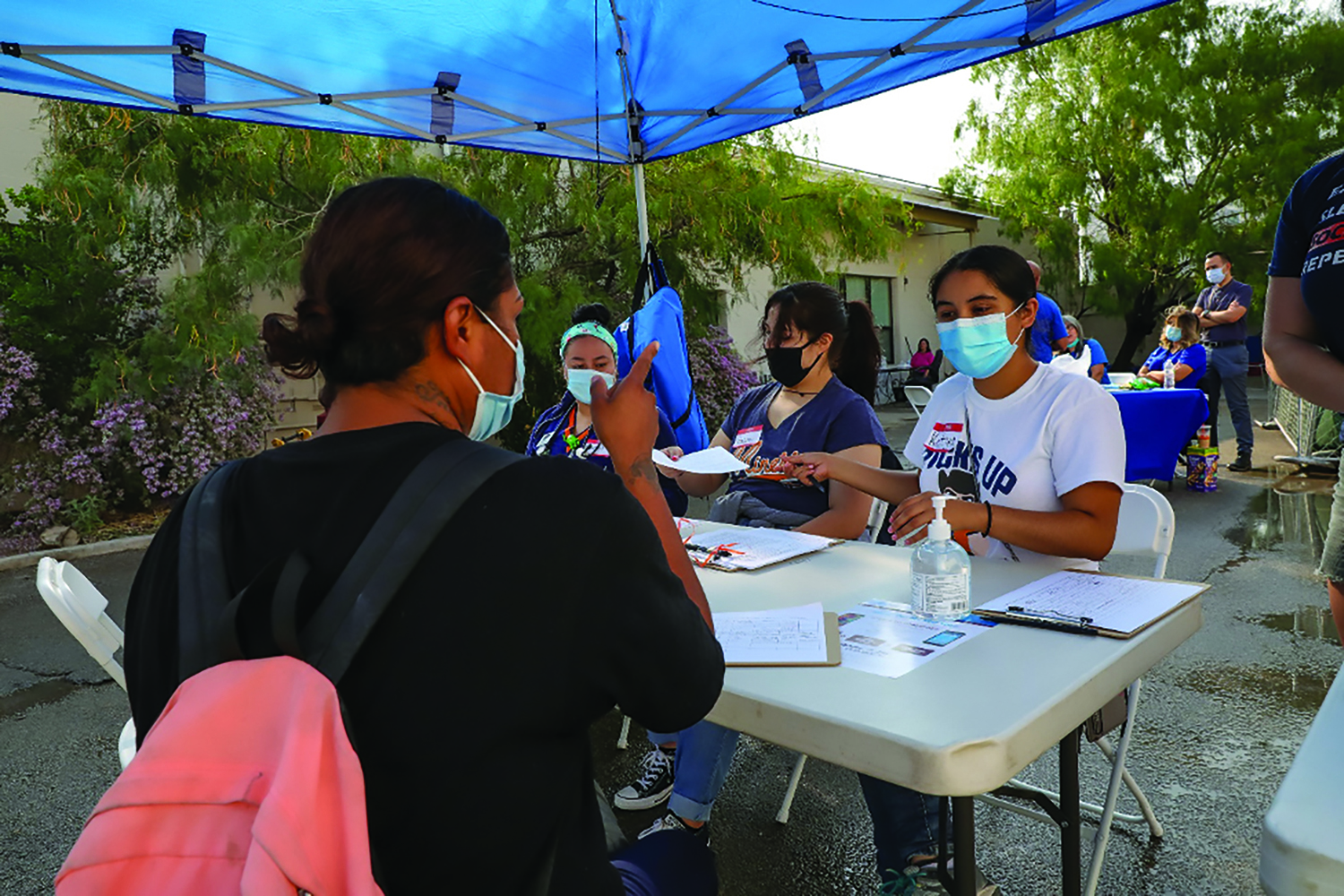 University of Texas at El Paso social work students volunteer at a Health Opportunity Prevention Education (HOPE) fair for members of the homeless and immigrant communities.
University of Texas at El Paso social work students volunteer at a Health Opportunity Prevention Education (HOPE) fair for members of the homeless and immigrant communities.
Courses
Special coursework on immigration would seem a natural, but the subject is already baked into the curricula at most Texas social work schools. At the University of Texas at El Paso (UTEP), in an area that’s 85 percent Hispanic, the BSW course “Introduction to Social Work” includes a heavy dose of “U.S.-Mexico border realities,” says Eva M. Moya, interim chair and associate professor of the Department of Social Work—and “Social Work in the U.S.-Mexico Border Region” is a required course. Moya’s own MSW class “Macro in Multicultural Practice” features “a lot of immigration/migration and human rights content,” she adds.
Associate professor Karina A. Gil, director of Hispanic-serving Our Lady of the Lake University’s Worden School of Social Service in San Antonio, says, “Immigration has been one of the issues that affect the Hispanic population, so it is embedded in our courses, from policy to case management.” The same goes for the School of Social Work at the University of Texas Rio Grande Valley (UTRGV), where Dr. Luis R. Torres-Hostos, founding dean and professor, calls both the region and school curricula binational. “In many of the courses in family therapy, individual therapy, etc., the assignments are focused on understanding the immigrant experience, particularly trauma—not only back in their countries of origin but on their way here as well.”
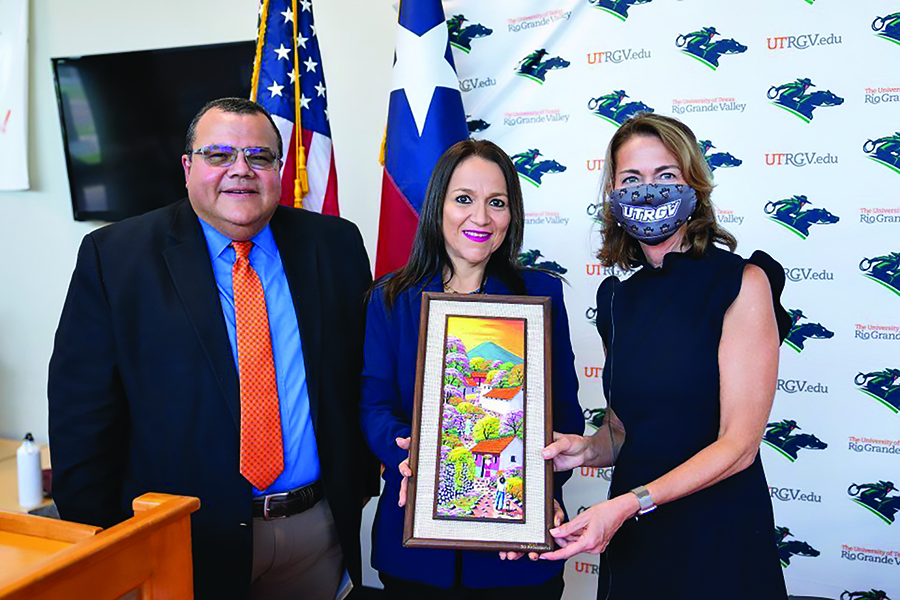 At the signing of a memorandum of understanding between the University of Texas Rio Grande Valley (UTRGV) and the Salvadoran Lutheran University (SLU) in September, Ada Ruth Gonzalez (center), SLU director of international relations, presents a commemorative gift to Dr. Luis Torres-Hostos, founding dean of the UTRGV School of Social Work, and Dr. Janna Arney, UTRGV deputy president and interim provost.
At the signing of a memorandum of understanding between the University of Texas Rio Grande Valley (UTRGV) and the Salvadoran Lutheran University (SLU) in September, Ada Ruth Gonzalez (center), SLU director of international relations, presents a commemorative gift to Dr. Luis Torres-Hostos, founding dean of the UTRGV School of Social Work, and Dr. Janna Arney, UTRGV deputy president and interim provost.
Fieldwork
Up in the Panhandle near Amarillo, Margaret L. DeJong-Shier, field director for the MSSW program and social work instructor at West Texas A&M University, is also heavily focused on immigration in managing field practicums. DeJong-Shier, who at one point was an immigration case manager in New Jersey, has set up numerous partnerships with organizations like the Refugee Services of Texas, the Texas Panhandle Center and Catholic Charities of the Texas Panhandle. Students help refugees, undocumented individuals and clients in the process of getting a green card, she says. “Amarillo is one of the places where Texas will relocate refugees, so right now we have a very high population of Thais and also Somalis.” (See also “West Texas A&M: Internships in the Panhandle,” below.)
A number of years ago, UTEP suspended on-site social work internships in Mexico, says Moya. “But even if we cannot go to Mexico, Mexico is here. Whether it’s the office of a senator, a nonprofit entity, a school or probate court, you’re going to be working directly and indirectly with individual migrants and migrant families across all age groups.” Recent partner organizations have included Las Americas Immigration Law Center, Hope Border Institute and Diocesan Migrant Refugee Services.
As COVID restrictions have eased in Texas, the UTRGV School of Social Work has revved up immigration-related fieldwork opportunities with such organizations as Catholic Charities, Proyecto de Desarrollo Humano (Human Development Project) and the American Red Cross of South Texas. Now the school is working on setting up field assignments in consulates, says Torres-Hostos, who has met with consuls from El Salvador, Guatemala, Honduras and Mexico. A lot of what these consulates do, he points out, amounts to social work: helping people obtain services, renew their passport or contact family back home.
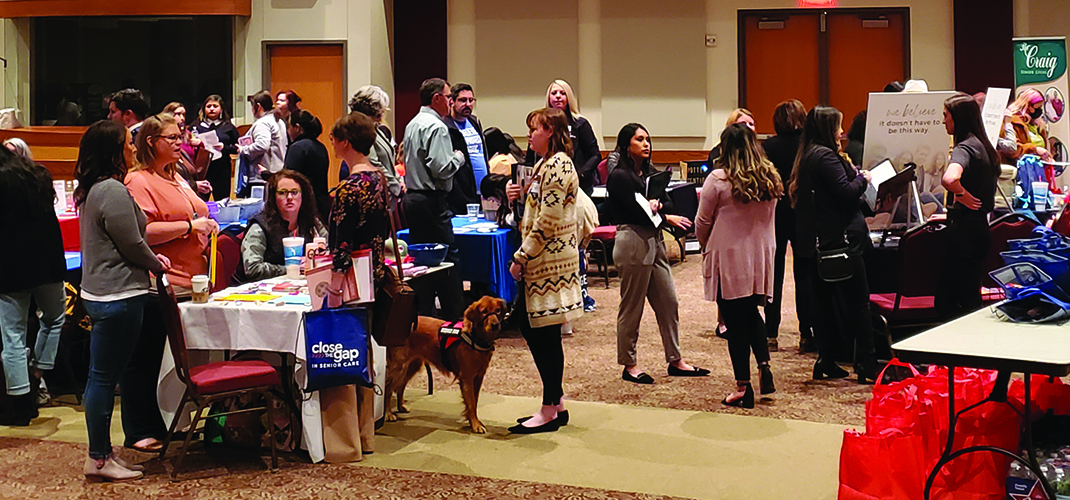 BSW students at West Texas A&M get information from agencies about internship opportunities during last semester's field fair.
BSW students at West Texas A&M get information from agencies about internship opportunities during last semester's field fair.
Special Initiatives
But Torres-Hostos and his school are going even further in the study of immigration by planning to cross the border—in fact, a number of borders. UTRGV has been signing memorandums of understanding (MOUs) with universities like the Salvadoran Lutheran University, National Autonomous University of Honduras and National Autonomous University of Mexico to establish faculty and student exchanges, joint research and other projects. “We want to provide our faculty and students opportunities to work with these communities, to understand why people leave their country, what they’re looking for, what challenges they face along the way and once they get here.”
Our Lady of the Lake University, too, has worked overtime to enhance immigration social work by holding panels on immigration issues with advocacy groups like the League of United Latin American Citizens and conducting a mini-conference called “The Dream Zone” to help bring awareness to the needs of DACA students. And UTEP has social work students volunteering at Doña Ana Village, run by Fort Bliss, to help Afghan refugees.
As West Texas A&M’s DeJong-Shier puts it, “Regardless of their current [immigration] status, these people need our help right here, right now. How can we serve that?”
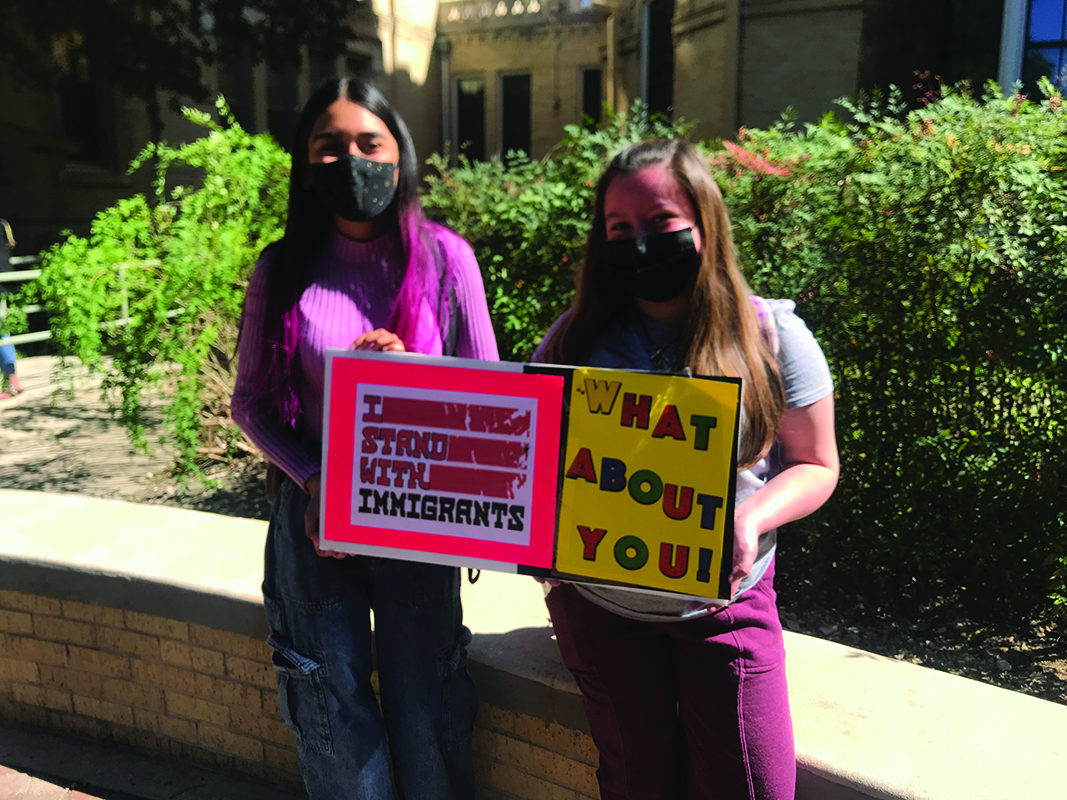 Our Lady of the Lake University students at an immigrant advocacy event conducted by the student-led Worden Social Work Organization.
Our Lady of the Lake University students at an immigrant advocacy event conducted by the student-led Worden Social Work Organization.
San Diego State University: Redressing Genocide Through Education
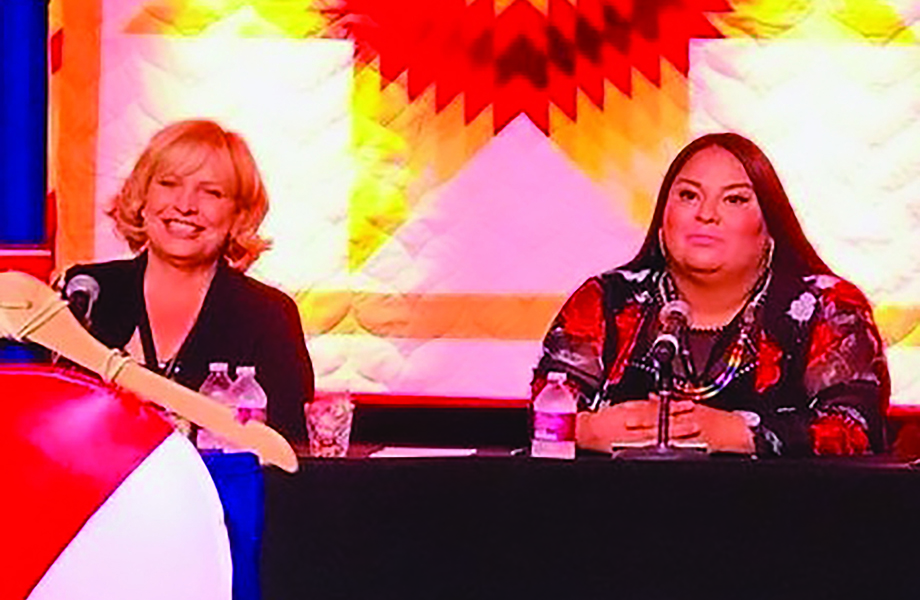 2018 Warrior Spirit Conference and Ceremony SERVE panelists Tamara Strohauer (left) and Shurene Premo, then a BASW student and an NASW Native American Birdwoman Scholar at San Diego State. Premo later earned her MSW there and became chair of the NASW Native American Council in California.
2018 Warrior Spirit Conference and Ceremony SERVE panelists Tamara Strohauer (left) and Shurene Premo, then a BASW student and an NASW Native American Birdwoman Scholar at San Diego State. Premo later earned her MSW there and became chair of the NASW Native American Council in California.
As part of San Diego State University’s increasing emphasis on JEDI (justice, equity, diversity and inclusion), the School of Social Work there has developed a program focused on the effects of California’s history of genocide against American Indians and dispossession of their land, says professor David W. Engstrom, Curriculum Committee chair and Graduate Program director. (The university itself, he says, is on Kumeyaay Nation land.)
Lecturer and field faculty member Tamara L. Strohauer, MSW, ASW, says that “the first governor of the state put up over a million dollars for hunting [indigenous] people, and 90 percent of California Indians did not survive the Gold Rush and the mission system here.”
Strohauer is one of three coordinators of the California Social Work Education Center’s SERVE: Indigenous Social Workers for Change, involving 20 social work schools. Its purpose is to “decolonize curricula” and recruit Native BSW and MSW students into Title IV-E programs, in which students get annual stipends in return for two years’ work in child welfare following graduation. Recent internships have been with the Pala Band of Mission Indians and the Southern Indian Health Council.
In addition, Strohauer developed an upcoming course—“Decolonizing Social Work with Indigenous Communities” —that will be for her school’s BASW and MSW students, and possibly American Indian Studies students as well. It will examine California’s scarred history, the Indian Child Welfare Act and the sovereignty of the state’s numerous tribal nations, culminating in a novel study-abroad experience on a reservation, potentially in partnership with Humboldt State University.
West Texas A&M: Internships in the Panhandle
West Texas A&M University MSSW students Karen Bider and Samantha Gonzales discuss the rewards and challenges of their current internships in Amarillo.
Please describe your MSSW internship, including what your host organization does and your role there.
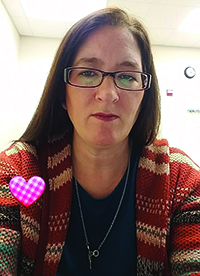
Bider: At Legal Aid of Northwest Texas, 13 lawyers handle everything from taxes, to immigration, to family law, to housing for the homeless. They may be lawyers, but because of how much they commit to outreach, they’re doing a lot of social work, too.
For my internship, they have me doing anything and everything—typing up drafts so we can get medical releases or calling people to get information, stories of what has happened, such as with domestic violence or sexual assault. We work with everybody from law enforcement to doctors. Anything that comes up, they’re like, “Karen can handle that.”
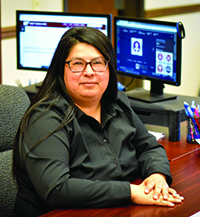
Gonzales: Texas Panhandle Centers assist individuals with mental health needs through therapy groups, counseling, housing and employment help. In my internship I support several departments. We do a needs and strengths assessment with every individual who comes across our caseload. Then the computer system will generate a level of care for them.
Separately, I work on staff as a case manager on our mobile crisis outreach (MCO) team, handling crisis calls. We’ll do a crisis assessment on whether the person may be suicidal or homicidal and often refer them to a hospital. We deal with social workers when we’re working with the Pavilion—a psychiatric hospital here in Amarillo. We’ll do a lot of back and forth on a client’s discharge planning to see what their next step is.